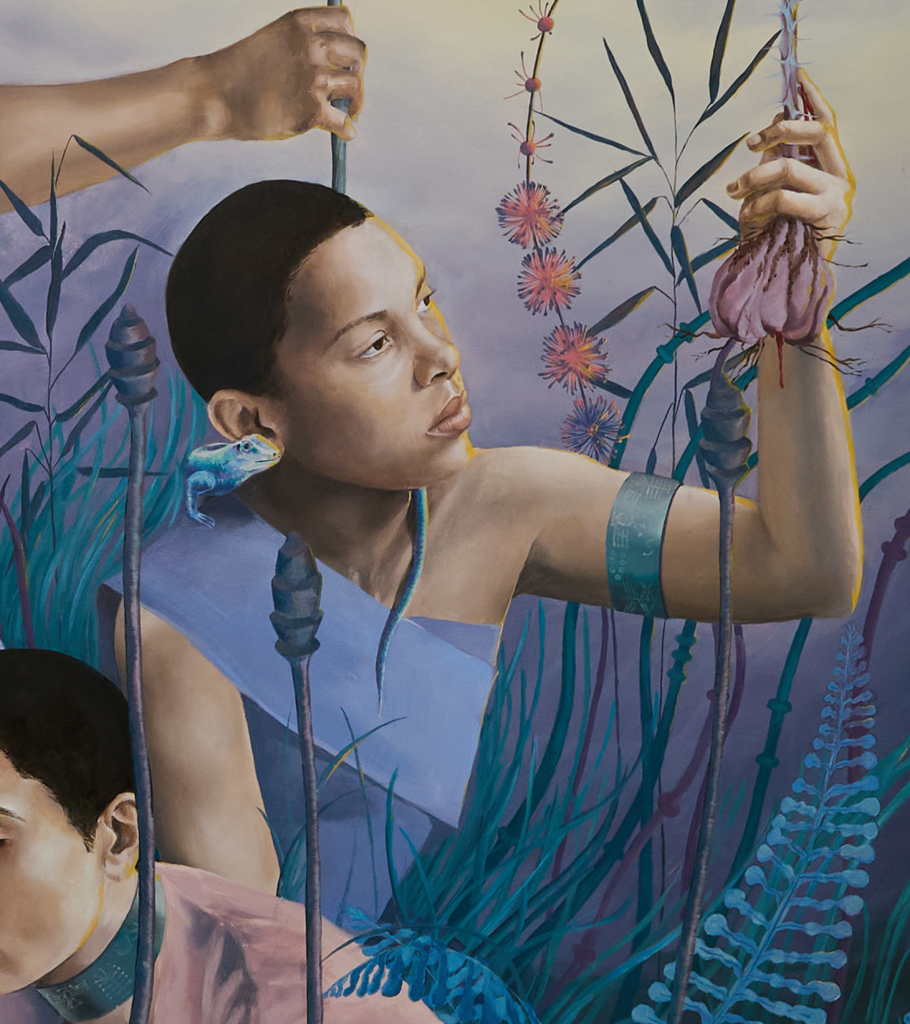

Join us on Tuesday 12th November, 7 – 8pm for ‘Seperated by Millenia: in conversation with Helen Starr’, led by artist Sarah al-Sarraj.
In the foreword to Never Whistle at Night, an Indigenous horror anthology, author Stephen Graham Jones reflects on settler land dispossession, asking: “So you took all that land you could see. But what about all this other territory you don’t even know about?” This question speaks to how, within many Global Majority cosmologies and ontological systems, alternate realms offer ways to understand erased histories, identities, and experiences. Spaces we cultivate—whether offline, online, in the Dreaming, the “third space,” or ancestral and spirit worlds—not only enable us to narrate our experiences but also act as counter-cartographies, reshaping how we view the world and resist ongoing oppressions.
The virtual realm is one such space that Global Majority artists are increasingly exploring to centre previously marginalised experiences and knowledge systems, adapting digital tools not designed for us to tell stories that help reshape our world.
Yet, as the creative sector continues to sideline marginalised voices and tech industries remain dominated by hyper capitalist elites, how can we ensure that marginalised artists gain equitable access to these new forms of digital storytelling?
In this context, Starr and al-Sarraj will delve into Starr’s work at the intersection of world building, storytelling, and immersive technologies. They will explore how Global Majority artists are reclaiming narratives and creating alternate realms that challenge oppressive systems. Additionally, the conversation will highlight Starr’s commitment to building a network of Global Majority, queer, and trans intersectional feminist creators, along with her innovative strategies for promoting equity for marginalised artists in the evolving landscape of digital storytelling.
This event is free to attend and will be held on Zoom. Please register here or email info@artworkassociation.org
Helen Starr is an Afro-Caribbean world-building curator and cultural activist originally from Trinidad. She moved to the United Kingdom in the early 1990s, where she has established herself as a significant figure in the art and technology sectors. In 2010, Starr founded The Mechatronic Library, an organisation dedicated to providing marginalised artists with access to advanced digital technologies, including Virtual Reality (VR), Augmented Reality (AR), and 3D printing. Her curatorial practice is deeply informed by decolonial, feminist, and indigenous perspectives, with a strong emphasis on community, healing, and learning.
Starr’s work has been featured in numerous public institutions, including FACT in Liverpool, Wysing Arts Centre in Cambridge, and QUAD in Derby. She has also contributed to academic discussions on art and technology, focusing on how digital systems influence human behaviour and societal norms. In addition to her curatorial work, Starr has served on various panels and juries, including the Computer Animation Jury for Ars Electronica, and has been involved in several high-profile exhibitions that explore the intersections of technology, culture, and identity.
Sarah Al-Sarraj is a British-Iraqi visual artist and cultural worker whose narrative-driven work employs speculation and fantasy to subvert and surpass global power structures, drawing on eco-anarchist, queer, and ancestral knowledge systems to construct and imagine new worlds. In 2023, she was awarded a grant from Arts Council England to develop her animation practice and is currently working with Helen Starr’s Mechatronic Library. Her work has been exhibited both nationally and internationally, with presentations at Camden Art Centre, 180 Strand, South London Gallery, and Wysing Arts Centre. She recently opened her first solo exhibition, ‘Separated by Millennia’ at Two Queens Gallery in Leicester, commissioned by the Arab British Centre. Alongside her practice, Sarah has a background of 8 years working in social justice with organisations such as Healing Justice London and Forensic Architecture, and broader work within Palestinian advocacy. She currently serves on the board of trustees at the Inclusive Mosque Initiative, an intersectional feminist abolitionist mosque.